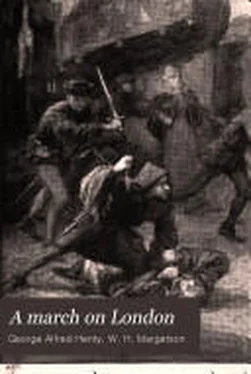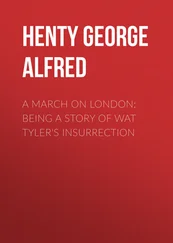“That is all right,” he said to his comrades. “Now keep a firm hold on the rope, but let it gradually out as I climb; if you hear me slipping draw it in rapidly so as to stop me as I come past the window. But there is no fear of that unless the hook gives way.”
Then he swung himself up to the roof of the dormer window and proceeded to haul himself by the rope up the steep incline, helping himself as much as possible with his feet and knees. He was heartily glad when he gained the ridge, and had thus accomplished the most dangerous part of the work. He was able now to fix the grapnel firmly, and sitting astride of the roof, he called down that he was ready. It was easier work for Albert to follow him. Not only was the latter certain that the grapnel was safely fixed, but Edgar, pulling upon the rope, was enabled to give him a good deal of assistance. In two or three minutes Hal Carter joined them.
“In faith, master,” he said, panting, “I had not deemed that so much of my strength had gone from me. If it had not been for the help you gave me I doubt if I could have climbed up that rope.”
They now made their way along to the end of the roof. The grapnel was fixed, and Edgar slid down the rope to the next roof, which was some fifteen feet below them. They did not attempt to free the grapnel, fearing that in its fall it might make a clatter; they therefore used another to mount to the next house, which was as high as that which they had left. There was but a difference of four feet in the height of the next, and they had not to use the grapnel again until they reached the sixth house, which was ten feet below that next to it.
[Illustration: THE PRISONERS MAKE THEIR ESCAPE OVER THE ROOFS OF YPRES.]
There was light enough to enable them to make out the position of the dormer window below them, and fixing the grapnel, Edgar, aided by his companions lowering him, made his way down beside it, and knelt upon the sill, his companions keeping a steady strain upon the rope. With his chisel he had but little difficulty in prising open the casement. His companions were not long in joining him. Once inside the house they made their way with great caution. They had no means of striking a light, and were forced to grope about with their swords in front of them to prevent their touching any piece of furniture, till at last they discovered the door. It was not fastened, and passing through, and, as before, feeling the floor carefully as they went, they presently found the head of the stairs.
After this it was comparatively easy work, though a stoppage was necessary at each landing. At last, to their satisfaction, they found themselves in a flagged passage, and knew that they were on the ground floor. They made their way along the passage, and soon reached the door. It was locked with so massive a fastening that it would have been difficult to unfasten it from the outside; but with the aid of the chisel they had but little difficulty in forcing back the lock. They paused for a minute to listen, as a passer-by might have been startled by the sound of the bolts being shot in an empty house. All was quiet, however, and, opening the door cautiously, Edgar stepped out.
“The street is all clear,” he said; “except half a dozen fellows watching in front of the house we have left, there is not a soul in sight.” The others joined him, closing the door silently behind them. They had not put on their shoes again, so with noiseless steps they crossed the street and turned up the one that had been indicated by Sir Robert. After going a few paces they stopped, put on their shoes, and then walked boldly along. When they reached the end of the street three figures came out from a deep doorway to meet them.
“Is all well?” one asked.
This was the signal that had been agreed upon.
“All is well, Sir Robert. We have escaped without any difficulty or aught going wrong.”
“The saints be praised!” the knight ejaculated. “These with me are Sir Oliver Drafurn and Sir Francois Regnault.”
“Right glad we are, knights,” one of them said, “that we can assist in giving you your freedom. A foul shame indeed would it have been had two such gallant fighters been massacred by this rascally mob, after yielding themselves to a knight.”
“Truly, sirs, we are greatly beholden to you,” Edgar replied, “and trust that an occasion may occur in which we may repay to some of your countrymen the great service you are now rendering us.”
They had gone but a short distance further when the door of a tavern opened and twelve or fifteen half-drunken soldiers poured out.
“Whom have we here?” one of them shouted. “Faith, if they are burghers they must pay for being thus late in the streets.”
“Silence, knaves,” Sir Francois Regnault said, sternly. “What mean ye by this roystering? Disperse to your quarters at once, or by St. James, some of you shall hang in the morning, as a lesson to others that the burgesses of Ypres are not to be insulted by drunken revellers.”
As by this time the speaker had moved on into the light that streamed through the open door, the soldier saw at once that it was a knight, and, muttering excuses, went hastily down the street. No one else was encountered until they reached the foot of the wall. Here Sir Robert took a hearty farewell of them. The two knights first mounted the steps to the wall.
As they reached the top a sentry close by challenged.
“France,” Sir Oliver replied; “and, hark ye, make no noise. I am Sir Oliver Drafurn, and I am here with Sir Francois Regnault to pass three messengers over the wall, bearers of important dispatches. We do not wish the news to get abroad, so take your halbert and march up and down.”
Hal Carter had brought one of the ropes, twisted round him for the purpose.
“You are on the side facing the English camp,” Sir Oliver said. “Those are the lights that you see ahead. You will have three ditches to swim, and will find it cold work, but there is no other way for it.”
After giving hearty thanks to the knights, the three were lowered, one at a time, and the rope was then dropped down. It was a good deal longer than was necessary for descending the wall, but Edgar, rather to the surprise of the others, had chosen it for the purpose. The first ditch was but ten yards away; it was some thirty feet across.
“Now,” Edgar said, “I will cross first. I am much the strongest, for neither of you has fully recovered his strength. The water will be icy cold, therefore I will swim across first, and do you, when I am over, each hold to the rope and I will pull you across.”
Short as was the distance the work was trying, for the night was bitterly cold, and the ditches would have been frozen hard, were it not that twice a day the besieged went out and broke the ice, which had now began to bind again. At last, however, Edgar got across.
“Do you take the rope, Albert, and let Hal hold on by you, for the passage I have made is but narrow.”
A few strong pulls on Edgar's part brought them across.
“It is well,” he said, as they climbed out, “that the knights promised to go one each way, to tell the watchers on the walls to take no heed of any sounds that they might hear of breaking ice, for that those leaving the town were doing so by their authority.”
The two other ditches were crossed in the same way, but the work was more difficult, as the besieged only broke the ice of these once a day.
“We should never have got across without your aid, Edgar,” Albert said. “I could scarce hold on to the rope. My hands are dead, and I feel as if I were frozen to the bone.”
“Let us run for a bit, Albert, to warm our blood. Another quarter of a mile and we shall be challenged by our sentries.”
CHAPTER XVIII.
Читать дальше












